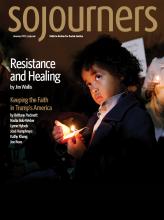Northmead Assembly of God Church in Lusaka, Zambia, is just like any other megachurch in the world’s megacities. About 1,500 worshippers gather for each of the two Sunday worship services. The music is emotionally uplifting, and Bishop Joshua Banda’s roaring preaching barely keeps members of the audience in their seats. Frequent amens and hallelujahs compete with the preacher’s increasing excitement. In every way, this is a typical Pentecostal church with a good dose of American influence and African traditional religious fervors.
However, this Pentecostal church also operates the Circle of Hope AIDS clinic. More people come here for HIV testing than to most government-run clinics, according to Banda, a sure sign of trust in this shame-oriented culture.
In the early 1990s, Bishop Banda didn’t think AIDS was an issue for his congregation. He was busy with preaching and evangelizing. According to census data, in 1985 the number of people infected with HIV in Zambia was about 36,000. By 1990, that number had jumped to nearly 300,000, and within five years it had doubled again. The AIDS pandemic threatened Zambia’s future.
Soon Banda was hit hard by the realization that AIDS was in his church. He became particularly aware of the suffering of widow lay leaders, and he realized if Zambia lost its future generations, there would be no church or mission at all. He set about to drastically change the direction of Northmead’s ministry.
Banda mobilized his large congregation’s resources to address this threat. Northmead established an intentional “discipleship” track to provide ministry and training for HIV/AIDS patients, their families, and the whole church. Northmead’s approach was holistic, covering spiritual, social, communal, educational, and medical assistance.
Read the Full Article

